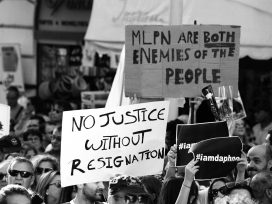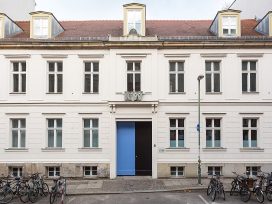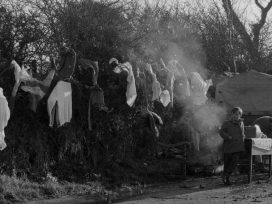‘Respect for truth and for the right of the public to truth is the first duty of the journalist.’
This is one of the principles considered as the bedrock of an uncompromising stand in defence of quality and ethical journalism listed in the 1954 Bordeaux Declaration by the International Federation of Journalists.
I defended that truth successfully in the appeal court in Malta this year after a five-year legal battle, during which my work was repeatedly discredited by state-sponsored trolls.
It all started when I was sued for libel in two separate actions by Patrick Dalli, the husband of Equality Minister Helena Dalli, because of articles by me in The Times of Malta about illegal development on a property belonging to a company they both owned. He won the initial action and I was accused of targeting the minister’s husband for political purposes and fined €10,000 ($11,260). But in March this year the appeal court overturned the ruling.
I won the case, thanks to the support of The Times of Malta. The newspaper stood by its stories and provided the legal backing. But the state broadcaster worded the news in such a way as to weaken the effect of the result. To this day, an online search on the case results in a string of hits that report the fine, but very little on the appeal victory.
The ruling defended the freedom of the press after the biggest blow ever given to the profession – the assassination of Malta’s most prominent journalist, Daphne Caruana Galizia. ‘A journalist has a duty to investigate and report on matters of public interest,’ the appeal judges ruled.
The reaction by the minister’s husband was to issue a warning on social media: ‘Don’t worry, Caroline. It’s far from over’. He proceeded to file a judicial protest, saying his rights had been breached.
There are no repercussions for those in power who threaten journalists in this way. And it is far from the only case. Increasingly, demands are made to remove published stories or face another case in court, no matter how factual the report or the evidence published.
The threat is multiplied by those using a handful of London law firms to threaten journalists with Strategic Lawsuits Against Public Participation (Slapps). These are lawsuits which can financially cripple journalists after taking cases against them in foreign jurisdictions, such as the USA and the UK.
When I launched The Shift News a few weeks after Caruana Galizia’s assassination, the first firm to threaten filing a lawsuit against me was Henley & Partners. This is the firm that promotes Malta’s controversial and legal cash-for-passports scheme. The letter we received clearly stated in bold, capital letters: ‘Not for Publication’. But it threatened to initiate a Slapp suit unless The Shift News removed a story we had published about the law firm’s work in Grenada.
It was impossible to fight it. Lawyers warned me there was no adequate protection. After Caruana Galizia was killed, it emerged that such a Slapp suit had been filed against her in the USA demanding €40 million ($44.8m). This was in addition to more than 40 libel cases she was facing at home.
We thought about the legal tactics used against Caruana Galizia as we were making the decision to fight it. But to give in to the lawyers’ demand would have meant The Shift News straying from its mission. And what is the point of yet another news portal which caves in to power?
As I debated possible courses of action with lawyers, we discovered that some mainstream media outlets in Malta had already complied with similar demands by Pilatus Bank to remove stories. The public was not told that the stories had been taken down, even though by doing so the public record was being altered.
Finding lawyers to take on such cases is far from easy. But it has been the one line of defence that has kept The Shift News alive. There are still some lawyers who are prepared to stand with us. They are instrumental in preserving the remnants of our democracy.
So, we refused to comply and we challenged the firm’s demand by publishing their letter in full, exposing for the first time how they were operating.
Right now, in Malta, journalists have to spend a disproportionate amount of time fighting back rather than doing their jobs. Without the lawyers supporting our cases, the legal costs alone would be sustainable, and the situation is getting worse.
Malta fell 12 places in the Reporters Without Borders’ World Press Freedom Index this year. The year before it dropped 18 places. Malta is now ranked 77th out of 180 countries.
The Venice Commission Opinion on Malta states the country does not have separation of powers or constitutional control by the courts, and citizens do not have access to justice in all cases. This was sustained by conclusions of the Council of Europe’s anti-corruption body, GRECO, which said Malta’s justice system was ‘at risk of paralysis.’
Retired European Court of Human Rights Judge Giovanni Bonello said the function of many of the judiciary was to ‘rubber-stamp abuse by the powerful’ when the courts should be the last wall of defence to protect democracy and the rule of law.
Out of 17 appointments to the judiciary in Malta under Prime Minister Joseph Muscat, 16 were all relatives of party politicians or connected to the Labour Party in power. ‘They have started a process that in 50 years’ time will still be a problem,’ Bonello said.
The prime minister steamrolled ahead, appointing another six members to the judiciary. And as this continues, there is hardly any hope left for journalists battling vexatious libel cases intended to silence them, leading to even more self-censorship.
And it is not just a problem for journalists in Malta. The independence of the media and the judiciary have also been described as being under attack in Hungary. The Helsinki Committee reported that laws introduced to restrict judicial independence and the freedom of judges to interpret the law have led to a situation where the government controls the courts. Lack of an independent judiciary means that journalists are left with no legal recourse to defend their work in the public interest.
In Albania, journalists who try to pursue legal recourse often find it difficult to find a lawyer to represent them, particularly when a government member is involved in the case. A report by the US Embassy concluded that the government posed the biggest threat to freedom of expression in that country.
Journalists rarely take action to protect themselves or to seek justice. They resort to self-censorship with the vast majority practising it at some point due to fear of retribution, losing their jobs, threats, or pressure from third-party interference, according to Reporters Without Borders.
The judiciary plays an essential role in the protection of freedom of expression, press freedom and access to information. It ensures the safety of journalists through prevention, protection and by the prosecution of crimes against them, UNESCO stresses. But in parts of Europe right now, this essential element of democracy is being severely eroded.







